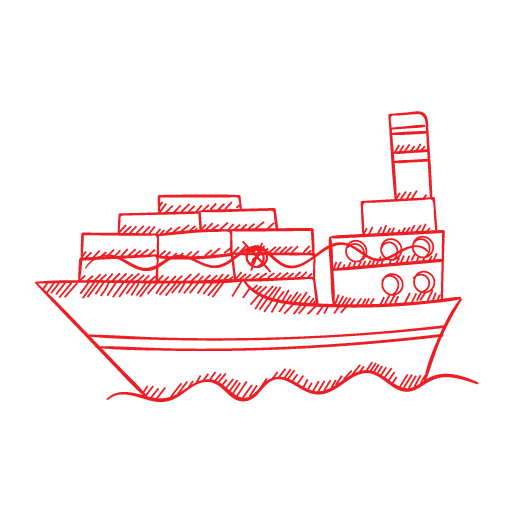Planning an international move and feeling overwhelmed at the thought of transporting your bulky items? Moving large items can be a challenging task, but fear not! We’ll reveal the secret to successfully moving overseas those cumbersome belongings without losing your mind. Whether it’s furniture, appliances, or other hefty possessions, we have expert tips and strategies to ensure a smooth and stress-free relocation. So, let’s dive in and discover the key to conquering the challenge of relocating large items across borders.

How to move heavy items? When relocating heavy items, use proper lifting techniques by bending your knees, keeping your back straight, and using your leg muscles. Utilize tools like dollies or sliders, and consider hiring professional movers for safe and efficient transportation.
Research and Planning Are a Must Before Moving Large Items
Research and planning are essential when moving large items across the country or abroad. Once you decide where to live, do thorough research on your destination, understand customs regulations, and consider logistics and transportation options, as they are crucial steps. For example, if you are relocating to Singapore, you should know that importing chewing gums is prohibited. Or if you are relocating to Japan, bringing allergy and cold medicine will be problematic.
After you have researched the country you are relocating to, you need to create a detailed budget, ensuring you account for the costs of booking overseas shipping company, insurance, and customs fees. Develop a packing strategy to protect your items during transit. Familiarize yourself with required travel documentation and legal procedures, allowing ample time for processing. Consider enlisting the assistance of professional movers experienced in shipping overseas to streamline the process.
Assess the Size and Weight of the Item
The next step you need to take when it comes to moving internationally is assessing the size and weight of the items. Firstly, it helps determine the feasibility of transporting the item in the first place. Consider the dimensions of doorways, staircases, and other potential obstacles in both the current and destination locations. Depending on the location where you plan to move, it can happen that there is no traffic at all in that area.
For example, if you move to Italy, most coastal old towns will not have traffic allowed inside the city. So plan carefully, especially if you plan to live in Europe, so you don’t end up carrying a sofa on thousands of old stairs uphill to your apartment. Many cities in Spain and other EU countries are old and of historic significance and don’t have infrastructure that can support the traffic. Or, if this is the case, consider hiring professionals to do this task with ease.
Additionally, you need to calculate transportation costs based on the weight and dimensions of the item is essential for proper budgeting. Different transportation methods have varying weight and size restrictions, and pricing structures may be based on these factors.

Research International Shipping Regulations and Restrictions
One crucial aspect is identifying prohibited or restricted items. As we mentioned, different countries have varying regulations regarding the importation of certain goods. Researching these restrictions beforehand allows you to determine if any of your large items fall into these categories. This knowledge will help you avoid potential legal issues or delays during the transportation process.
Moreover, understanding customs and import/export procedures is vital. Familiarize yourself with the documentation requirements, such as customs forms and declarations, necessary when relocating overseas. Each country has specific procedures and protocols that must be followed for successful customs clearance.

Find a Reputable International Moving Company to Assist You With the Move
Relocating across the world is not a simple task, and in most cases, you will have to hire an overseas moving company to help you with your move. When choosing a company, the goal is to find a reputable one that can offer you the best services.
Look for companies with a proven track record in handling international relocations, preferably the ones that can offer you plenty of options like moving abroad by sea or air. Research customer reviews, seek recommendations from trusted sources, and verify their licensing and insurance credentials to avoid relocation scammers. A reliable relocation company will provide professional packing service, secure auto transportation, and proper handling of your valuable possessions, ensuring a smooth and stress-free move.
Use More Than One International Moving Service
Hiring a single international moving company to handle all aspects of your move, from packing, car transport, and storage to actual transportation, can provide numerous benefits and make the process significantly better and easier. By entrusting the entire relocation to a professional shipping company, you can enjoy a seamless and streamlined experience.
Some companies, such as I Love International Moving, offer free standard packing services as part of their services. This means they will pack all your furniture and other large items for free.
Firstly, a comprehensive packing service takes care of packing your belongings using appropriate materials and techniques, ensuring their safety and minimizing the risk of damage during your move abroad. This saves you the time and effort of handling the packing process yourself.
Additionally, a reliable relocation company will handle the logistics of transporting your car. This eliminates the need for separate arrangements or hiring additional services.
Focus on Packaging and Preparation
So how to move something heavy? Well, you need to learn how to properly prepare and pack those items first. Proper packaging and preparation are crucial when relocating large items. By giving careful attention to these aspects, you can ensure the safety of your belongings during transit and minimize the risk of damage.
Choose the Right Packaging Materials
Selecting the appropriate packaging materials is vital when packing for relocation. Focus on protecting the item from damage during transit. Use sturdy cardboard boxes, bubble wrap, packing peanuts, and foam padding to provide cushioning and prevent movement. Additionally, consider the weather conditions and transport modes involved in your relocation.
If your items will be exposed to moisture or extreme temperatures, use moisture-resistant or insulated packaging materials to safeguard against potential harm. Here is a comprehensive list of all supplies you may need if you plan to pack your home alone:
- Cardboard boxes – Sturdy boxes in various sizes to accommodate different items.
- Bubble wrap – Provides cushioning and protection against impact.
- Packing peanuts – Lightweight foam peanuts fill empty spaces and prevent shifting.
- Foam padding – Sheets or rolls of foam for added protection and wrapping.
- Furniture blankets – Thick blankets to wrap and protect furniture surfaces from scratches.
- Plastic stretch wrap – Transparent plastic wrap for securing and protecting furniture and bulky items.
- Duct tape – Strong adhesive tape for sealing boxes and securing wrapping materials.
- Labels and markers – Labels to identify the contents of each box and markers for clear labeling.
- Box cutters or scissors – Tools for opening boxes or cutting packing materials.
- Straps and tie-downs – Straps and tie-downs secure large items or hold furniture components together.
- Corner protectors – Foam or plastic protectors for safeguarding the corners of furniture or fragile items.
- Custom crates – Specialized crates for fragile or valuable items requiring extra protection.
- Ziplock bags – Small bags for organizing and storing smaller components or screws.
- Blankets – Thick, heavy-duty blankets provide an additional layer of protection.
- Furniture sliders – Specialized sliders or gliders are used to transfer heavy furniture with ease.
These packing materials will help ensure that your large items are properly protected and secured during international relocation, minimizing the risk of damage or loss.
Disassemble and Secure the Items
To protect your large items further, it is often necessary to disassemble them before packing. Take the necessary precautions to avoid breakage during this process. Carefully label and bag small components, screws, or parts, ensuring they are securely attached to the main item or stored in clearly labeled containers. By disassembling and securely packing the different components, you minimize the risk of losing or damaging smaller parts, making reassembly at the destination easier and more efficient.
Go Over Insurance and Legal Considerations
To safeguard your large items during relocation, it is crucial to address insurance and legal considerations. Assessing the need for insurance coverage involves evaluating the value of your belongings and researching suitable options for international shipments. Understanding liability and claims procedures is equally important, as it allows you to familiarize yourself with the relocation company’s policies and take necessary precautions.
Documenting the condition of your items before shipping and promptly reporting any damage or losses ensures a smooth claims process. By paying attention to these insurance and legal aspects, you can protect your large items, minimize risks, and have peace of mind throughout the relocation process.

Discuss Shipping Methods With Your International Movers
Having different shipping options when shipping large items internationally is essential for several reasons. Firstly, it allows you to tailor your choice based on the specific requirements of your items. Different shipping methods offer varying levels of security, transit times, and cost-effectiveness. By having multiple options, you can select the one that best aligns with your priorities.
Moreover, having different shipping methods provides flexibility in terms of volume. If you have a large number of items, opting for a Full Container Load (FCL) may be the most suitable choice, as it offers exclusive use of a shipping container. On the other hand, if your items do not fill an entire container, choosing Less Container Load (LCL) allows for cost-effective consolidation with other shipments.
Additionally, different shipping methods may cater to specific transportation requirements. For instance, international moving by air is ideal for time-sensitive or high-value items, while sea freight is more cost-effective for bulk shipments. By having various options, you can select the most appropriate method based on factors such as urgency, budget, and the nature of your large items. So when choosing a company to help you with your relocation, make sure you find the one that can provide you with all the options, like I Love International Moving.

Full Container Load (FCL) vs. Less Container Load (LCL)
One key consideration is whether to opt for a Full Container Load (FCL) or a Less Container Load (LCL) shipping method.
With FCL, you have exclusive use of an entire shipping container for your belongings. This option is suitable if you have a significant volume of large items or if you prefer your items to be packed and sealed separately from other shipments. FCL offers the advantage of faster transit times and reduced risk of damage or loss.
LCL is ideal if you have a smaller quantity of items or if your items do not fill an entire shipping container. In this case, your belongings will be consolidated with other shipments in a shared container. LCL can be a cost-effective option as you only pay for the space your items occupy, but it may result in longer transit times and increased handling during loading and unloading.
Discussing the pros and cons of both FCL and LCL with your international movers will allow you to make an informed decision based on factors such as the volume of your items, your budget, and your desired transit time. Your movers can guide you on the most suitable option that aligns with your specific requirements and ensures the safe and timely transportation of your large items.

With the Little Bit of Help Moving Bulky Objects Internationally Won’t Be a Problem
With the right assistance, relocating bulky objects internationally doesn’t have to be a hard task. By carefully considering factors such as research and planning, packaging and preparation, shipping methods, insurance, and legal considerations, you can navigate the complexities of international relocation with confidence.
To make the process even smoother, consider reaching out to I Love International Moving, a trusted company experienced in handling international relocations. Our expertise, attention to detail, and dedication to customer satisfaction will ensure a seamless and stress-free relocation for your large items. Contact I Love International Moving today and let our professional team assist you in making your international relocation a success.
FAQ
Large items typically refer to bulky furniture, appliances, pianos, vehicles, or other substantial objects that require special handling or equipment for transportation.
The cost of relocating a large item internationally depends on factors such as its size, weight, destination, shipping method, and additional services required. Obtaining quotes from multiple relocation companies is the best way to determine an accurate cost estimate.
Some common challenges include logistics and transportation, customs procedures, packaging and protection, complying with international regulations, and navigating potential language or cultural barriers.
Proper packaging using appropriate materials, disassembling and securing the item if necessary, utilizing professional packing services, and opting for insurance coverage can help protect your large item during international transit.
Insurance options vary among relocation companies but typically include full coverage, declared value protection, or additional insurance for high-value items. Consult with your chosen relocation company to understand the insurance options available to you.
Researching customs regulations, understanding import/export procedures, and ensuring accurate and complete documentation are key. Professional movers can assist with customs requirements and guide you through the necessary paperwork.
The choice between Full Container Load (FCL) and Less Container Load (LCL) depends on the volume of your items. FCL is preferable for larger shipments, while LCL is cost-effective for smaller quantities.
Reputable relocation companies provide tracking services, allowing you to monitor the progress of your shipment online. They will provide you with a tracking number to access real-time updates.
In the unfortunate event of damage or loss, promptly report the issue to your relocation company and follow their prescribed claims procedure. Providing documentation, such as photographs and item descriptions, will assist with the claims process.
While not mandatory, hiring professional assistance for relocating large items internationally is highly recommended. Professional movers have the expertise, experience, and resources to handle the complexities of international relocations, ensuring a smoother and more efficient process.














